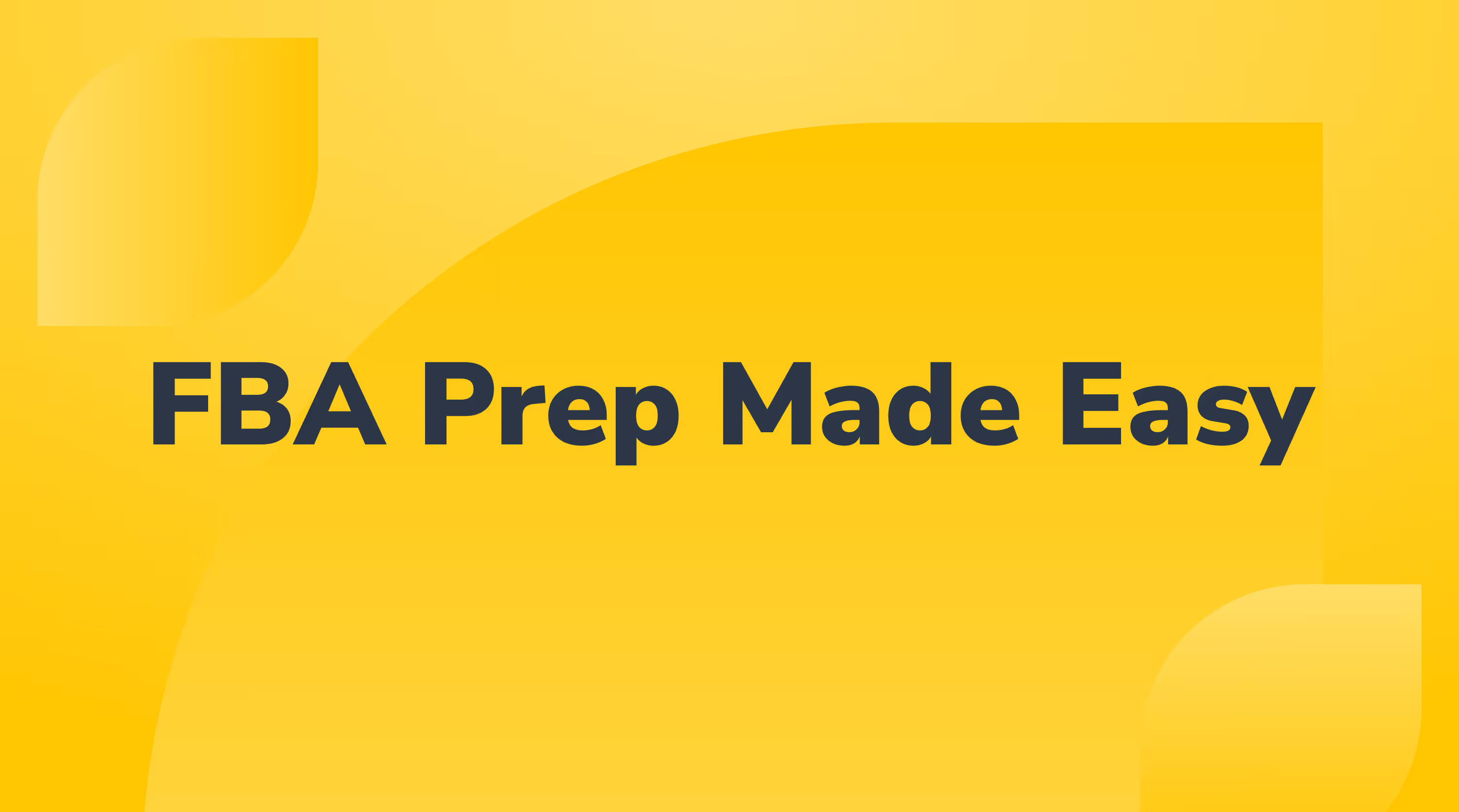The Ultimate Guide to FBA Prep & Packaging

You've sourced a great product, created a perfect listing, and you're ready to ship your first batch to Fulfillment by Amazon (FBA). But before your inventory leaves your control, it must pass one final, critical test: Amazon's strict prep and packaging requirements.
Improper prep is one of the most common—and entirely avoidable—reasons for inbound shipment problems. It can lead to lengthy receiving delays, costly unplanned prep service fees from Amazon, and even the refusal of your entire shipment at the fulfillment center door. This guide is your essential checklist for the most common FBA prep requirements to ensure your products arrive safely and are checked in quickly.
1. The Foundation: The FNSKU Label
The FNSKU (Fulfillment Network Stock Keeping Unit) is Amazon's internal barcode. It's how they identify your specific product and link it directly to your seller account within their vast warehouse network.
- When is it needed? If you are a private label brand owner or are not using the manufacturer's barcode for tracking (known as "commingled inventory"), you must apply an FNSKU label to every single unit.
- The Golden Rule of Barcodes: Each unit must have one, and only one, scannable barcode visible on the exterior. Your FNSKU label must completely cover any other barcodes on the packaging (like a UPC or EAN).
2. The Core Prep Requirements: A Checklist
Different products require different types of prep. Here are the most common.
1. Poly Bagging
- When to use: Required for clothing/textiles, plush toys, products sold in perforated packaging, and to prevent dust or leakage for items like powders and some liquids.
- The Rules:
- The bag must be transparent and at least 1.5 mil (0.038 mm) thick.
- For bags with an opening of 5 inches (12.5 cm) or more, a suffocation warning must be printed on the bag or applied as a sticker.
- The bag must be completely sealed.
- The FNSKU barcode must be scannable on the outside of the bag.
2. Bubble Wrapping
- When to use: Required for fragile items that could break during transit, such as glass jars, ceramic mugs, or delicate electronics.
- The Rules:
- The item must be securely wrapped so it can pass a 3-foot (approx 1 meter) drop test onto a hard surface without breaking.
- The FNSKU barcode must be scannable on the outside of the bubble wrap.
3. "Sold as Set" / Bundles
- When to use: When you are selling multiple products as a single, unique unit (e.g., a shampoo and conditioner set).
- The Rules:
- All items in the set must be securely packaged together (e.g., in a box, a sealed bag, or with shrink-wrap).
- You must apply a label that clearly states "Sold as Set," "Ready to Ship," or "This is a Set. Do Not Separate." This prevents the FBA receiving team from opening your bundle and checking in the items individually.
3. Special Category Requirements
- Expiration-Dated Products: For any product with an expiration date (like groceries or supplements), the date must be clearly printed on the outer packaging in a font size of at least 36-point. The required format is MM-YYYY or MM-DD-YYYY.
- Sharp or Pointed Items: Products with sharp edges or points that could be a safety hazard must be packaged securely (e.g., in a blister pack or sturdy box) so the sharp part cannot become exposed during handling.
4. The Final Step: The Shipping Box
The box you use to send your inventory to Amazon also has strict rules.
- Box Type: Use a rigid, six-sided box with its flaps intact.
- Weight Limit: A single box must not weigh more than 23 kg (50 lbs) unless it contains one single oversized item. Any box weighing over 15 kg must be clearly marked with "Heavy Package" labels on the top and sides.
- Size Limit: A standard-sized box must not measure more than 63.5 cm (25 inches) on any one side.
- FBA Shipping Labels: Each box in your shipment requires a unique FBA shipping label, which you will generate and print during the "Send to Amazon" workflow in Seller Central.
Perfect product prep is the foundation of an efficient FBA business, but it's just one part of a complex supply chain. As a full-service agency, Sitruna manages the entire process, from sourcing and compliance to international freight and final FBA prep, ensuring your products are always ready for sale.
Useful Resources
- Amazon Seller Central: Packaging and Prep Requirements
- Amazon Seller University: Video Guides on FBA Prep
Conclusion: Precision Prevents Problems
FBA prep is a game of precision and following instructions to the letter. While it may seem tedious, getting it right the first time is the key to a smooth, fast, and cost-effective receiving process. Mastering these steps is fundamental to building an efficient and scalable Amazon operation.
Need a partner to manage your end-to-end supply chain, including all FBA prep? Schedule a free discovery call with the Sitruna team at www.sitruna.com/meet to build a seamless and scalable logistics strategy.



